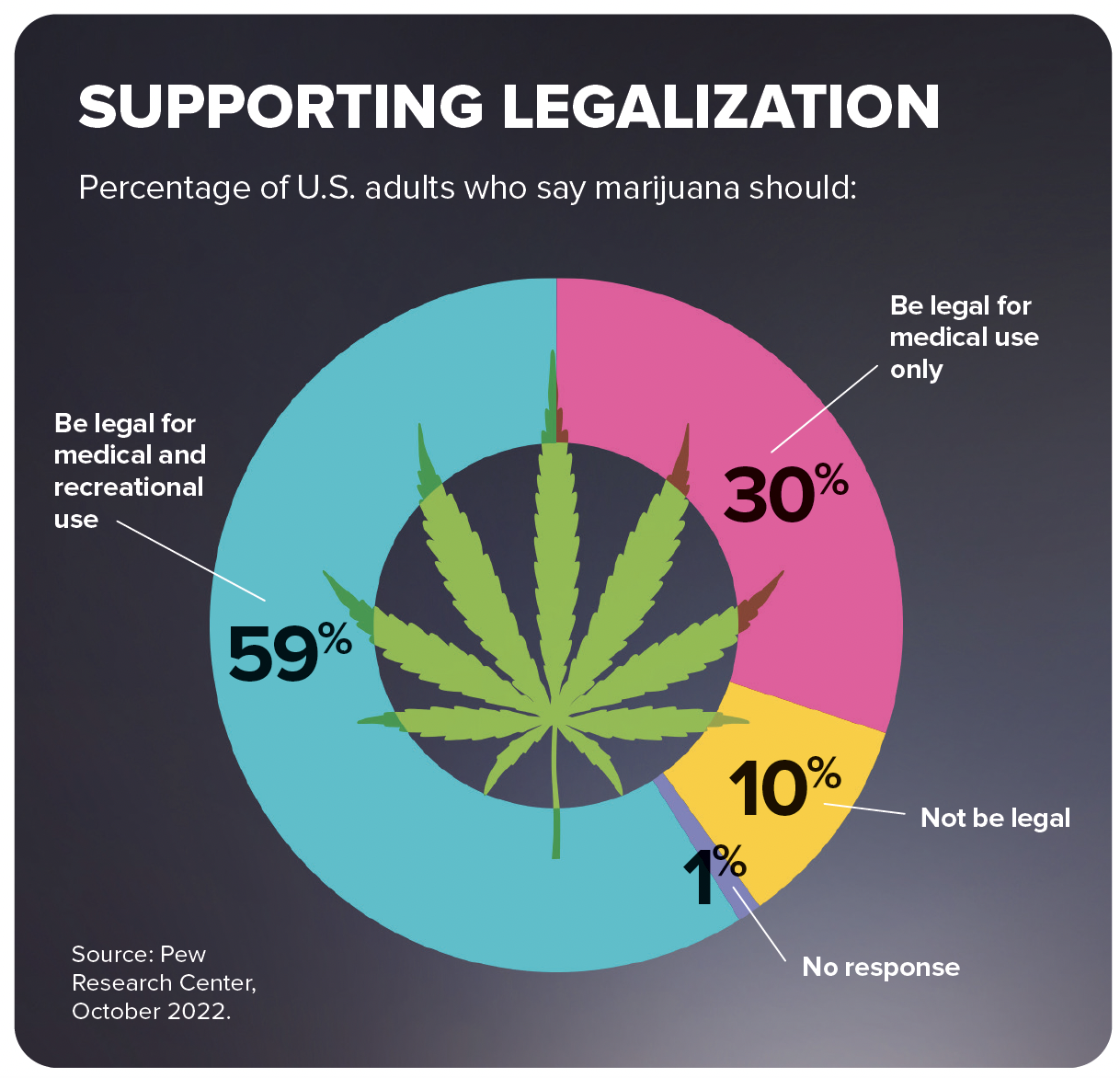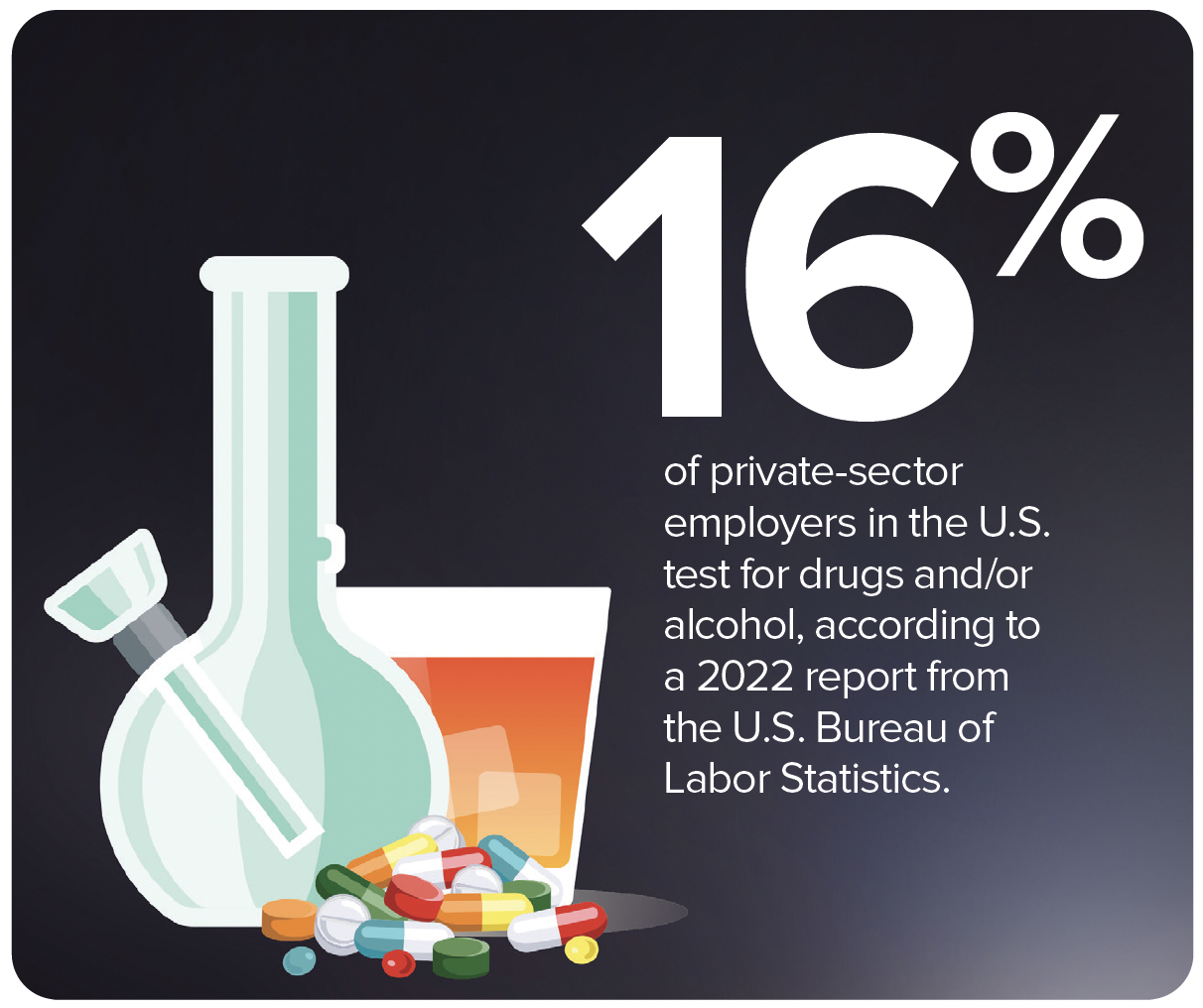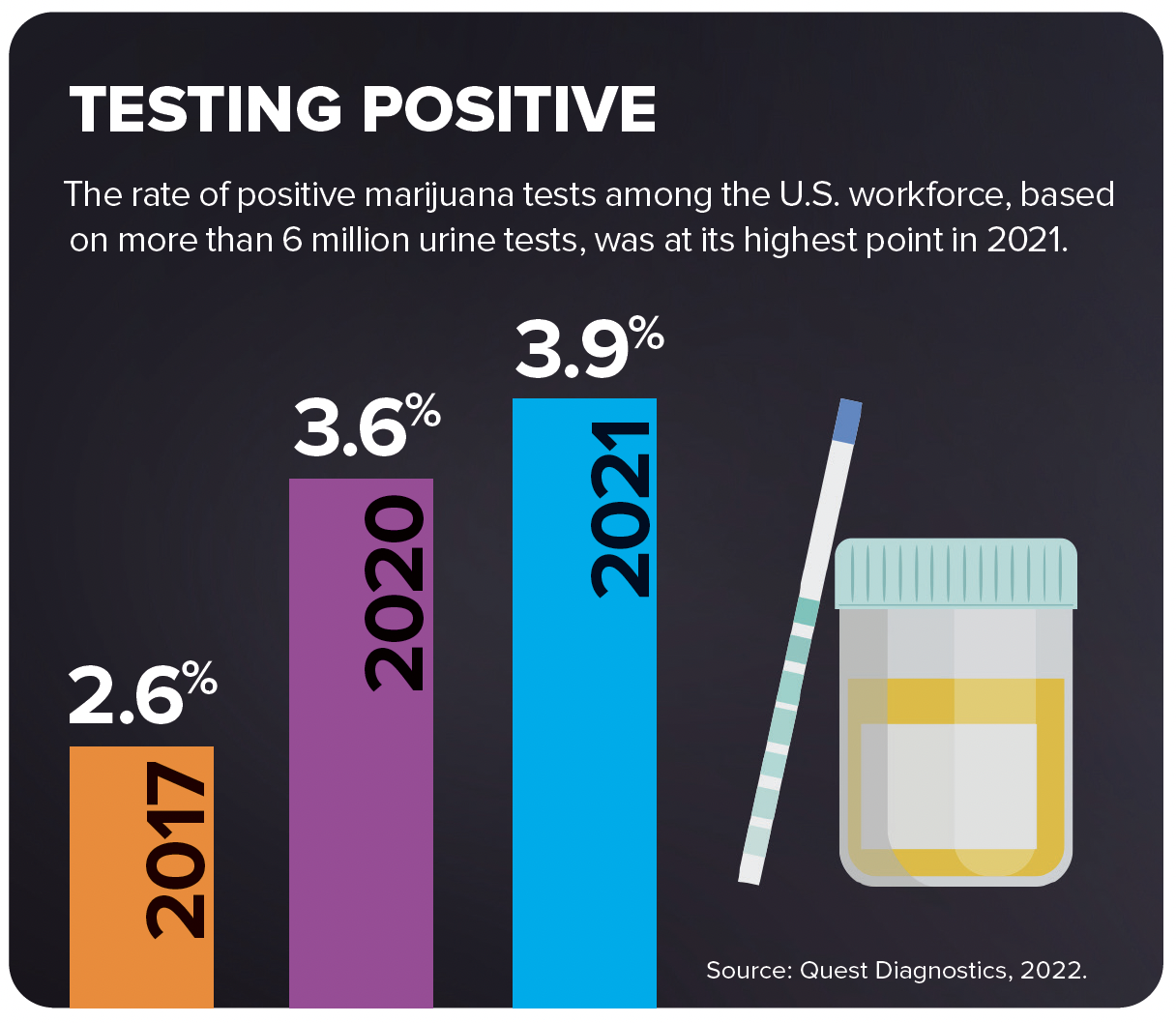
?Michelle Ustaszeski-Hutchinson was ready to start a job as a resident care assistant at a personalized senior care community in Richland, Pa., when the opportunity went up in smoke.
During her pre-employment screening, which included a drug test, she presented the employer with her state medical marijuana card and sent a copy of it to the company’s medical review officer, explaining that she uses marijuana to treat her post-traumatic stress and anxiety disorders. (Pennsylvania has a comprehensive medical marijuana program.)
Two weeks later, she received an e-mail explaining that her conditional offer of employment had been rescinded.
After Ustaszeski-Hutchinson sued the company seeking lost pay and benefits, lost future pay and compensatory damages, she settled for an undisclosed amount, according to Law360.
Nearly half of Americans live in states where marijuana use is legal, and companies are struggling to understand what they’re allowed to accept within the confines of the workplace.
Can an employer ban the drug, even if someone is using marijuana for medical purposes as prescribed by a doctor, such as to ease the pain of a migraine or the side effects of chemotherapy? Can employees take a puff whenever they want to? Should employers be barred from asking workers to undergo drug testing?
Answers to these questions, along with seemingly everything else cannabis-related, can be murky.
But some facts are crystal clear: Marijuana is still a federally banned substance, and states are making their own marijuana laws.
So before employers start firing employees who fail drug tests or who appear to be red-eyed and sleepy, HR professionals need to know the relevant laws—and then determine with company leaders how their organizations view the use of cannabis by employees.
“In general, each workplace environment is entitled to have and enforce its own policies, especially when it comes to private employers,” says Michael O’Brien, CEO and general counsel at Sonoran Roots, a craft cannabis company in Tempe, Ariz., and a member of the Arizona Dispensaries Association board of directors.

Navigating State Laws
Despite the federal ban, recreational use of cannabis is now legal in 21 states, along with Washington, D.C., and Guam. Additionally, medical marijuana programs are sanctioned in 37 states, plus D.C., Guam, the Northern Mariana Islands, Puerto Rico and the Virgin Islands.
In the November 2022 elections, residents of Maryland and Missouri voted to legalize recreational marijuana, while voters in Arkansas, North Dakota and South Dakota rejected such proposals.
Most people agree that marijuana should be legalized to some extent. According to a 2022 Pew Research Center survey of more than 5,000 U.S. adults, 59 percent said marijuana should be legal for both medical and recreational use, while 30 percent said it should be legal for medical use only. Just 10 percent said it shouldn’t be legal at all.
Despite the public acceptance of marijuana use, employers have latitude on how to approach the issue. Most state laws give businesses the ability to maintain a drug-free workplace and prohibit the consumption of cannabis while at work, says Jennifer Fisher, a partner in the San Francisco office of the Goodwin law firm and co-chair of its cannabis practice.
In 1986, President Ronald Reagan instituted drug testing for federal employees. By 1990, an estimated 43 percent of the largest U.S. employers (those with more than 1,000 employees) were mandating drug testing.
Today, that number has dropped significantly. Just 16 percent of private-sector employers of all sizes test for drugs and/or alcohol, according to a 2022 report by the U.S. Bureau of Labor Statistics.
But if marijuana has been legalized in an employer’s state, can the company legally fire someone for failing or refusing to take a drug test?
Employers are generally allowed to test employees for the presence of drugs, though in most cases they aren’t required to administer tests. Most states impose some restrictions on drug testing, such as allowing it only when there is suspicion of substance use or following a workplace accident.
Federal law requires drug testing for employees in safety-sensitive jobs such as transportation.
In Florida, former state correctional officer Samuel Velez Ortiz was dismissed after failing a random drug test last year, according to local news reports. At the time, he had a state medical marijuana card issued as part of his treatment for post-traumatic stress disorder.
Velez Ortiz challenged the dismissal in court. His attorneys argued in a legal brief that his employer was attempting to “cloud the main issue of this case by ignoring the fact that appellant was terminated for being a legal medical marijuana user.”
But Velez Ortiz lost his case. Under Florida law, employers are allowed to require workers to submit to random drug tests, and they are allowed to fire employees at will for failing those drug tests—even if employees have a valid medical marijuana card.

Indulging at Work?
Employers may choose to treat marijuana like alcohol and allow employees with medical marijuana cards to consume cannabis when they aren’t working, so long as they aren’t under the influence when they report for work.
But the issue isn’t always clear-cut, as demonstrated by a recent case involving a District of Columbia government worker.
In Washington, D.C., testing for marijuana is allowed when there is a reasonable suspicion of drug use. Nonetheless, an administrative judge with the D.C. Office of Employee Appeals reversed the firing of an employee who was suspected of being intoxicated on the job.
The employee, who tested positive for marijuana but had a card permitting its use for medical purposes, told her employer she hadn’t used cannabis at the time of her testing but had consumed it over the weekend.
“Because [the] employee was allowed to perform her duties and did in fact adequately do so after being observed by her supervisors, I find that [the supervisors] did not reasonably believe that the employee’s ability to perform her job was impaired,” the judge wrote. “As such, I further conclude that a reasonable suspicion referral was unwarranted.”
It’s tricky to determine whether an employee is actually under the influence of marijuana, because the drug can stay in a person’s system for longer than 30 days.
There isn’t currently a test available to determine if someone is experiencing the effects of the drug, and workplaces therefore aren’t able to accurately determine whether someone is totally sober at work.
“My hope is that as things progress, there’ll be a technological fix that will allow us to determine if a worker is under the influence, the way that we’re able to do that with alcohol,” said Douglas Parker, assistant secretary of labor for occupational safety and health, during Bloomberg Law’s Leadership Forum in 2022.
Don’t Be Hasty
Absent such a technological fix, employers should resist jumping to conclusions.
“A company needs to be careful when disciplining medical marijuana users,” says employment attorney David Reischer, CEO of New York City-based LegalAdvice.com.
Many states have laws protecting medical cannabis patients from employment discrimination, though those laws are limited.
In Rhode Island, for example, employers can’t refuse to hire medical marijuana patients who fail a drug test. But the state doesn’t allow anyone to undertake tasks when they are under the influence of marijuana if doing so would constitute negligence or professional malpractice. Plus, the law states, “nothing in this chapter shall be construed to require an employer to accommodate the medical use of marijuana in any workplace.”
If state laws like this seem confusing, it’s because they are.
“There is the legal answer and then there is the practical answer,” says Laura Bianchi, a partner with law firm Bianchi & Brandt in Scottsdale, Ariz.
Because marijuana remains illegal from a federal perspective, employers are within their rights to prohibit consumption while at work. If an employee is impaired at work and consumption poses a safety risk or negatively affects their ability to perform the required functions of their job, an employer can terminate the employee for violating the policy, Bianchi says.
As a result, HR professionals must clearly explain in company policies and handbooks what will and won’t be tolerated when it comes to marijuana use.
These rules, however, must fall within the legalities of individual states. Employers in Arizona, for example, must understand that medical marijuana card holders are allowed to possess medical marijuana within the allowable limit.
“However, the statutory protections do not extend to possession or consumption at the workplace during business hours,” Bianchi says. “In these situations, the policies of the employer will likely dictate whether or not you may possess medical marijuana at your place of work.”
If a company has offices in multiple states with differing drug laws, HR professionals can establish their companies’ own policies—again, making sure employees understand the provisions in place for their locations.
“Depending on the size of the company, the industry and those setting the policies at the company, this could vary from complete prohibition of employee use to a hands-off policy,” O’Brien says. “If and when cannabis becomes federally legal, there will likely be overarching legal guidance that will apply for specific workplace issues, similar to how such laws and policies developed related to COVID.”
But that time has not yet arrived, so HR professionals must continue to monitor the issue.
“It’s a constantly changing and evolving area of the law,” Bianchi says, “so for most of our clients, it’s an ongoing discussion.”

Making Adjustments
For some HR professionals, however, the discussion has turned to action.
After New Jersey voters approved legalizing marijuana for recreational use in 2020, state lawmakers enacted legislation and crafted regulations in 2021 to make it happen.
At that point, one New Jersey health care company removed marijuana from its 10-panel pre-employment drug test—even though some of the company’s 500 employees work in Pennsylvania and Delaware, where the drug isn’t legal.
“We’re in an area where staff can easily travel to all three states, so we have designed policies around New Jersey for now,” says the company’s director of human resources, who asked not to be named.
After making an employment offer, the HR team informs job candidates that the company doesn’t test for marijuana. The no-show rate for the drug test has dropped since the marijuana screening was eliminated, making it easier to fill positions, she says.
However, the company also makes it clear to all employees that they cannot be impaired at work.
“We drive this home during orientation, and they are required to report to their supervisors any medication that they are on if it would impair their ability on the job,” the HR director says.
Under the New Jersey state law, employers are prohibited from taking adverse action against an employee based solely on a positive drug test.
On the recommendation of the company’s attorney, the HR team advises managers to focus on employee behavior, specifically watching for signs of impairment. The company requires two managers to observe the individual in question and document physical or behavioral signs of impairment; “reasonable suspicion” of drug use must be established before the company requires the employee to take a drug test.
The state law requires employers to use a certified workplace impairment recognition expert, but regulations aren’t yet finalized.
Appealing to Applicants
Meanwhile, a 2022 Quest Diagnostics study found that the rate of positive marijuana tests in the general U.S. workforce, based on more than 6 million urine tests, continues to climb. The positive rate increased from 2.6 percent in 2017 to 3.6 percent in 2020 and 3.9 percent in 2021.
“Employers are wrestling with significant recruitment and retention challenges as well as with maintaining safe and engaging work environments that foster positive mental and physical well-being,” said Keith Ward, general manager and vice president of Quest Diagnostics Employer Solutions, in a written statement last year. “Eager to attract talent, employers may be tempted to lower their standards.”
Danielle Braff is a freelance writer based in Chicago.
Image from Smartboy10 and Wavebreakmedia / ISTOCK.

